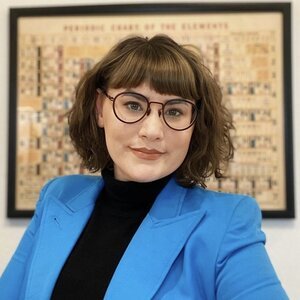Meet the Catalyst Team
At Catalyst Education, many of our employees are educators who have experience teaching in the lab. This expertise is what helps us develop solutions that help instructors inspire students to become the next generation of instructors, scientists, and problem-solvers. Mandy Dark, a Lab Solutions Developer here at Catalyst, brought her skills and knowledge to the team in July 2020.
A former TA, Mandy double-majored in biochemistry and microbiology, did three years of undergraduate research in organic chemistry, and post-graduate research at the intersection of organic chemistry, chemical biology, and immunology. It’s safe to say she knows her way around the lab! Before joining Catalyst, Mandy worked at a small education non-profit in Dallas, heading up the natural sciences curriculum and instruction. She was also an adjunct professor at Dallas College, where she taught lab and lecture, as well as a content writer for Macmillan/Sapling Learning.
We asked Mandy five questions to get to know more about her and her time here at Catalyst Education. Here’s what she had to say:
What brought you to Catalyst Education?
I started using Chem101 in my lecture when we transitioned to fully remote learning during the spring 2020 semester, and I learned about Catalyst Education through 101Edu. Catalyst was a great fit for my interests in curriculum development and technology innovation in the lab.What do you like most about working in this field?
My favorite part of my job is thinking about the student and instructor experience and finding ways to optimize it. As a former TA and adjunct professor, I understand the frustrations that come with the role and look for ways to improve the experience while helping students succeed.How do you think technology helps improve learning?
I think validation of student data, automatic grading of the calculations, and immediate feedback are incredibly powerful tools for learning. If students use Labflow while they are collecting their data in the lab, we can catch mistakes that TAs—despite their best efforts—can’t always catch in time, like recording data that does not reflect the precision of the instrumentation or forgetting to tare a balance. Then, once they start working on their calculations and analysis, being able to automatically grade their answers based on their data (good or bad!) and provide immediate feedback really helps to lower the stakes and ensure that the emphasis is on what they did in lab, why they did it, and what their results mean, rather than just the final score.What do you hope to see in education in the future?
I hope to see more and more research and career-inspired chemistry laboratory activities. For chemistry majors, I think it’s very valuable for them to be able to experience things early on that they may go on to do as a practicing chemist. For non-majors, giving them hands-on examples of how chemistry is intertwined with so many other fields can pique their interest and help them to see why they really do need to know some chemistry.Who was your favorite teacher growing up and why?
My two favorite teachers in elementary school were Mrs. Cynda Gilbert (third grade) and Mr. Paul Stepina (fourth grade math and science). These two teachers stood out as unique in my school, emphasizing discovery and challenging us to think independently. Coming from a school with limited resources, their efforts helped me grow during these formative years.
Mandy is looking forward to seeing how the expanded offerings in visual data and UX changes will further improve the student experience with Labflow this fall. When it comes to long-term goals, Mandy is working with the team to explore additional features to enhance Labflow, such as the tagging and assessment of learning objectives and lab skills. We’re glad to have Mandy on our team as we continuously work toward enhancing our solutions for the best possible outcomes for your students.

